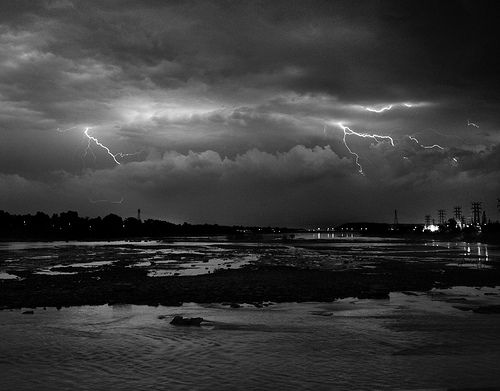Troubled Waters: Has The India-Pakistan Water Conflict Reached A Boiling Point?

Please note that we are not authorised to provide any investment advice. The content on this page is for information purposes only.
For years, the Indus River has brought water (and life) to both India and Pakistan. But today, the river now stands at the centre of a water conflict between the two South Asian neighbours, which threatens to escalate into violence. Is a water war between India and Pakistan imminent, and what is China’s role in the whole thing?
A peaceful and stable Pakistan is integral to Western efforts to pacify Afghanistan, but Islamabad’s obsessions with its giant eastern neighbour, India, may render such issues moot.
For years, the Indus River has brought water (and life) to both India and Pakistan. But today, the river now stands at the centre of a water conflict between the two South Asian neighbours, which threatens to escalate into violence. Is a water war between India and Pakistan imminent, and what is China’s role in the whole thing?
A peaceful and stable Pakistan is integral to Western efforts to pacify Afghanistan, but Islamabad’s obsessions with its giant eastern neighbour, India, may render such issues moot.
Since their partition in 1947, Pakistan and India have fought four armed conflicts: in 1947, 1965, 1971 (which led to the establishment of Bangladesh, formerly East Pakistan), as well as the 1999 Kargil clash. Apart from the 1971 conflict, which involved rising tensions in East Pakistan, the other battles have all involved issues arising from control over Kashmir. Today however, a rising new element of discord threatens to precipitate yet another armed clash between southern Asia’s two nuclear powers.
In an editorial entitled “War With India Inevitable” published in Lahore’s ‘The Nation’ on Sunday, the newspaper’s Editor-in-Chief and Nazaria-i-Pakistan Trust Chairman, Majid Nizami, asked his fellow citizens to prepare for a war with India over water issues.
Nizami also told those attending the “Pakistan-India relations: Our rulers’ new wishes” session at Aiwan-e-Karkunan Tehrik-e-Pakistan, that, “Indian hostilities and conspiracies against the country will never end until she is taught a lesson.”


While The Nation – a conservative daily that is part of the Nawa-i-Waqt publishing group – may have a circulation of just 20,000 readers, its close ties to Pakistan’s highest military circles mean that Nizami’s comments should hardly be rejected out of hand. 


Tellingly, Nizami’s audience at the session also included some high ranking Pakistani officials, including Nazaria-i-Pakistan Vice Chairman Dr Rafique Ahmed; Pakistan Movement Workers-Trust Chairman, retired Colonel Jamshed Ahmed Tareen; former Foreign Secretary Shamshad Ahmed Khan; Jamiat Ulema-e-Pakistan Secretary General Qari Zawar Bahadur; retired Air Marshall Khurished Anwar Mirza; retired Brigadier Hamid Saeed Akhtar and Jamaat-e-Islami Lahore Chief Ameer-ul-Azeem, among others.
At the heart of the issue are Pakistan’s concerns over India’s ongoing construction of two hydroelectric dams on the upper reaches of the Indus River. The Indus, which begins in Indian-controlled Kashmir and flows through both India and Pakistan, is Pakistan’s primary freshwater source, on which 90 percent of its agriculture depends.
Related: Pakistan Economy
Related: Pakistan Economic Statistics and Indicators
The 45-megawatt, 190-feet tall Nimoo-Bazgo concrete dam and the 44-megawatt Chutak hydroelectric power project, Islamabad believes, will reduce the Indus River’s flow towards Pakistan, and are capable of storing up to 4.23 billion cubic feet of water, which will violate the terms of the bilateral 1960 Indus Water Treaty.
[quote]Already the Indus is experiencing water flows that are down 30 percent from its normal levels. According to a number of Pakistani agriculture and water experts, the nation is heading towards a massive water shortage in the next couple of years due to insufficient water management practices and storage capacity, which will be exacerbated by the twin Indian hydroelectric projects.[/quote]So, if push comes to shove, who’s got Pakistan’s back? China. 


During the Boao Forum for Asia held in China’s southern Hainan Island on 1 April, Pakistan and China agreed to support each other “in all circumstances” and vowed to uphold their sovereignty and territorial integrity at all costs.
Pakistani Prime Minister Syed Yousuf Raza Gilani told Chinese Executive Vice Premier Li Keqiang: “China’s friend is our friend, and China’s enemy is ours,” adding that Pakistan considers China’s security as its own security and supports China’s position on Taiwan, Tibet and Xinjiang.
Li replied that China would support Pakistan’s sovereignty and territorial integrity in every situation, telling Gilani: “No matter what changes take place at international level, we will uphold Pakistan’s sovereignty and territorial integrity.”


It might be noted here that in October 1962, coinciding with the Cuban missile crisis, India and China fought a brief but bitter war along their disputed Himalayan border. Fifty years later, China and India have yet to resolve their border issues over Kashmir; and China continues to claim most of India’s Arunachal Pradesh territory to the base of the Himalayas in the absence of any definitive treaty delineating the border.
Related: India and China Butt Heads in South Asia
Related: New India / China “Confrontation” in Himalayas Not Good Sign
Related: Kashmir “Intifada”: India’s “Other” Front
Kashmir today also remains the site of the world’s largest and most militarized territorial dispute with portions under the de facto administration of China (Aksai Chin), India (Jammu and Kashmir), and Pakistan (Azad Kashmir and Northern Areas). 

No guesses therefore as to whom Beijing might back should Pakistani-Indian tensions continue to rise.
Accordingly, the only way to keep the peace may be, as to paraphrase Ronald Reagan in Berlin: “Prime Minister Singh, tear down those dams!”

Just don’t bet on it.
By John C.K. Daly, OilPrice.com
Pakistan and India to go to War over Water? is republished with permission from OilPrice.com




